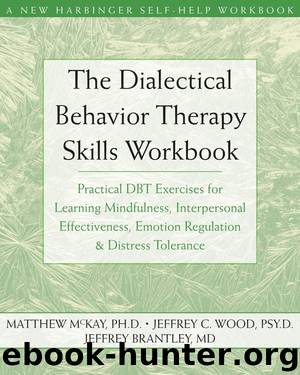The Dialectical Behavior Therapy Skills Workbook: Practical DBT Exercises for Learning Mindfulness, Interpersonal Effectiveness, Emotion Regulation, and Distress Tolerance by McKay Matthew & Wood Jeffrey & Brantley Jeffrey

Author:McKay, Matthew & Wood, Jeffrey & Brantley, Jeffrey [McKay, Matthew]
Language: eng
Format: epub
ISBN: 9781608820504
Publisher: New Harbinger Publications
Published: 2007-07-01T00:00:00+00:00
As you can see, doing what’s effective sometimes means not doing what you feel like doing or not doing what you’ve been habitually doing for many years. This is why mindfulness is such an important part of doing what’s effective. If you’re going to change the way you behave in the present moment, you have to be aware of what you’re thinking, feeling, and doing in the present moment so that you can choose to do what’s effective.
Doing what’s effective also depends on not making judgments. You already know that making both positive and negative judgments can lead to disappointment and suffering. But making judgments about situations and your actions can also prevent you from doing what’s effective. Here’s an example: Judith had a math teacher who assigned homework that Judith thought was too hard. “This is ridiculous,” she thought to herself. “How unfair of him to give us these assignments. This is wrong; he shouldn’t be allowed to do this. I’m not going to do the homework.” So she didn’t. But as a result, she failed the class. Judith’s judgments about what was “right” and “wrong” prevented her from doing what was effective. Clearly, it would have been more beneficial to her if she had remained mindful of her thoughts and feelings, avoided judging the assignments, and just done the best that she could.
Doing what’s effective is doing what is necessary in a given situation in order to get a resolution to a problem. Doing what’s effective isn’t “selling out,” “giving up,” or “caving in.”
Doing what’s effective is a skill, just like acting. Sometimes in order to get what you want, you have to behave in a certain way. Sometimes you have to act as if you are competent, skilled, or satisfied in order to reach your goal, even if you don’t feel that way. And that’s what effective actions are designed to do—help you reach your goals. In the example above, Judith’s goal was to get a satisfactory grade in her math class. But she allowed her judgments and feelings to prevent her from reaching that goal.
Remember, in order to do what’s effective, you have to do the following:
Be mindful of your thoughts and feelings.
Avoid judging the situation or your actions.
Choose actions that are appropriate and necessary to reach your goal.
Do the best you can.
Download
This site does not store any files on its server. We only index and link to content provided by other sites. Please contact the content providers to delete copyright contents if any and email us, we'll remove relevant links or contents immediately.
Periodization Training for Sports by Tudor Bompa(8254)
Bodyweight Strength Training by Jay Cardiello(7908)
Born to Run: by Christopher McDougall(7121)
Inner Engineering: A Yogi's Guide to Joy by Sadhguru(6785)
Asking the Right Questions: A Guide to Critical Thinking by M. Neil Browne & Stuart M. Keeley(5759)
The Fat Loss Plan by Joe Wicks(4907)
Bodyweight Strength Training Anatomy by Bret Contreras(4677)
Yoga Anatomy by Kaminoff Leslie(4358)
Dynamic Alignment Through Imagery by Eric Franklin(4208)
Science and Development of Muscle Hypertrophy by Brad Schoenfeld(4127)
Exercise Technique Manual for Resistance Training by National Strength & Conditioning Association(4063)
ACSM's Complete Guide to Fitness & Health by ACSM(4057)
The Four-Pack Revolution by Chael Sonnen & Ryan Parsons(3974)
Bodyweight Strength Training: 12 Weeks to Build Muscle and Burn Fat by Jay Cardiello(3961)
The Ultimate Bodybuilding Cookbook by Kendall Lou Schmidt(3936)
Yoga Anatomy by Leslie Kaminoff & Amy Matthews(3905)
American Kingpin by Nick Bilton(3876)
Nutrition for Sport, Exercise, and Health by Spano Marie & Kruskall Laura & Thomas D. Travis(3776)
Yoga Therapy by Mark Stephens(3742)
